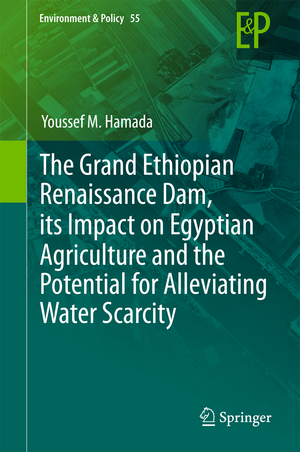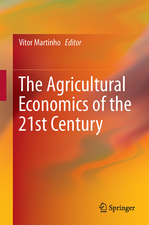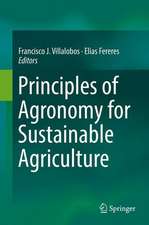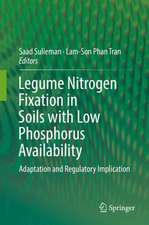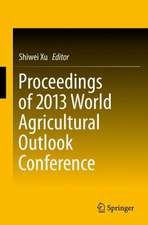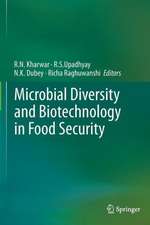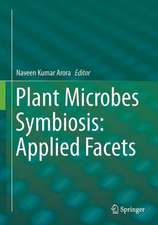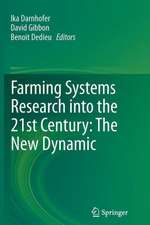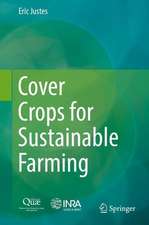The Grand Ethiopian Renaissance Dam, its Impact on Egyptian Agriculture and the Potential for Alleviating Water Scarcity: Environment & Policy, cartea 55
Autor Youssef M. Hamadaen Limba Engleză Hardback – 26 iun 2017
Many international summits and conferences have declared that there is an urgent need to save agriculture from its demise. Most international agencies now recognize that something must be done, but what? Beyond policy changes, the restructuring of global governance and institutional reforms are called for. Commitments must be translated into concrete actions leading to a renewed interest in agriculture and a return to the basic objective of achieving food security.
| Toate formatele și edițiile | Preț | Express |
|---|---|---|
| Paperback (1) | 503.83 lei 38-44 zile | |
| Springer International Publishing – aug 2018 | 503.83 lei 38-44 zile | |
| Hardback (1) | 783.68 lei 22-36 zile | |
| Springer International Publishing – 26 iun 2017 | 783.68 lei 22-36 zile |
Din seria Environment & Policy
- 15%
 Preț: 641.20 lei
Preț: 641.20 lei -
 Preț: 402.77 lei
Preț: 402.77 lei -
 Preț: 407.01 lei
Preț: 407.01 lei - 15%
 Preț: 641.85 lei
Preț: 641.85 lei - 18%
 Preț: 955.08 lei
Preț: 955.08 lei - 18%
 Preț: 944.82 lei
Preț: 944.82 lei - 15%
 Preț: 650.19 lei
Preț: 650.19 lei - 18%
 Preț: 952.89 lei
Preț: 952.89 lei - 15%
 Preț: 642.68 lei
Preț: 642.68 lei - 18%
 Preț: 1227.36 lei
Preț: 1227.36 lei - 18%
 Preț: 1226.90 lei
Preț: 1226.90 lei - 15%
 Preț: 642.18 lei
Preț: 642.18 lei - 15%
 Preț: 641.53 lei
Preț: 641.53 lei - 15%
 Preț: 643.48 lei
Preț: 643.48 lei -
 Preț: 385.25 lei
Preț: 385.25 lei - 20%
 Preț: 335.52 lei
Preț: 335.52 lei - 15%
 Preț: 640.88 lei
Preț: 640.88 lei - 15%
 Preț: 638.43 lei
Preț: 638.43 lei - 15%
 Preț: 636.12 lei
Preț: 636.12 lei - 18%
 Preț: 941.50 lei
Preț: 941.50 lei - 18%
 Preț: 946.55 lei
Preț: 946.55 lei - 18%
 Preț: 945.30 lei
Preț: 945.30 lei - 18%
 Preț: 948.29 lei
Preț: 948.29 lei - 18%
 Preț: 959.19 lei
Preț: 959.19 lei - 18%
 Preț: 957.44 lei
Preț: 957.44 lei - 18%
 Preț: 955.70 lei
Preț: 955.70 lei - 15%
 Preț: 639.90 lei
Preț: 639.90 lei
Preț: 783.68 lei
Preț vechi: 955.70 lei
-18% Nou
Puncte Express: 1176
Preț estimativ în valută:
149.96€ • 156.96$ • 124.81£
149.96€ • 156.96$ • 124.81£
Carte disponibilă
Livrare economică 10-24 martie
Preluare comenzi: 021 569.72.76
Specificații
ISBN-13: 9783319544380
ISBN-10: 3319544381
Pagini: 187
Ilustrații: XVI, 187 p. 17 illus., 12 illus. in color.
Dimensiuni: 155 x 235 mm
Greutate: 0.49 kg
Ediția:1st ed. 2017
Editura: Springer International Publishing
Colecția Springer
Seria Environment & Policy
Locul publicării:Cham, Switzerland
ISBN-10: 3319544381
Pagini: 187
Ilustrații: XVI, 187 p. 17 illus., 12 illus. in color.
Dimensiuni: 155 x 235 mm
Greutate: 0.49 kg
Ediția:1st ed. 2017
Editura: Springer International Publishing
Colecția Springer
Seria Environment & Policy
Locul publicării:Cham, Switzerland
Cuprins
Chapter 1. Introduction.- Chapter 2. The Nile River.- Chapter 3. The Nile River Basin and Water Security.- Chapter 4. Dams and Barrages on Rivers Channels.- Chapter 5. Effects of Dams and Barrages on Rivers Channels.- Chapter 6. The Legal Aspects of the Nile River.- Chapter 7. Agriculture and Irrigation.- Chapter 8. Agriculture and Irrigation in Nile Basin.- Chapter 9. Agriculture and Irrigation in Egypt.- Chapter 10. Efficiency Use of Irrigation Water.
Notă biografică
Prof. Youssef M. Hamada is a professor of agricultural economy at the Agricultural Economics Research Institute, Agricultural Research Center, Egypt and was a researcher at the Central Laboratory for Design and Statistics Analysis Research at the same institution. He received his B.Sc. (1983) in agriculture economics, his M.Sc. (1995) in the economics of the bread industry in A.R.E from Al-Azhar University, and his Ph.D. (2001) in the possibilities of the bread industry development in A.R.E from the University of Al-Azhar, Egypt. Further, he has a diploma in translation of Arabic into English from the Translation Center, American University, Egypt. He received training from ECARDA, Aleppo, Syria, 2005 (training course on building databases and electronic websites) and participated in an international training workshop on Economic Development Policies and Practices for Desertification and Dry Land for Affected African Countries from the Chinese Academy of Forestry, Beijing, China 2008.He has published more than 30 papers in national and international journals, as well as a book chapter.
Textul de pe ultima copertă
This book covers the entire Nile Basin and reflects the latest findings. It provides unique and cutting-edge insights into the region’s agriculture, water resources, governance, poverty, productivity, upstream-downstream linkages, innovations, future plans and their implications.
Many international summits and conferences have declared that there is an urgent need to save agriculture from its demise. Most international agencies now recognize that something must be done, but what? Beyond policy changes, the restructuring of global governance and institutional reforms are called for. Commitments must be translated into concrete actions leading to a renewed interest in agriculture and a return to the basic objective of achieving food security.
Many international summits and conferences have declared that there is an urgent need to save agriculture from its demise. Most international agencies now recognize that something must be done, but what? Beyond policy changes, the restructuring of global governance and institutional reforms are called for. Commitments must be translated into concrete actions leading to a renewed interest in agriculture and a return to the basic objective of achieving food security.
Caracteristici
Explores the present and future of the downstream Nile, based on water and agricultural data Presents mathematical models on water resource management for the downstream Nile Introduces socio-economic developmental outlines for the downstream Nile that can also be applied to most Nile Basin countries
